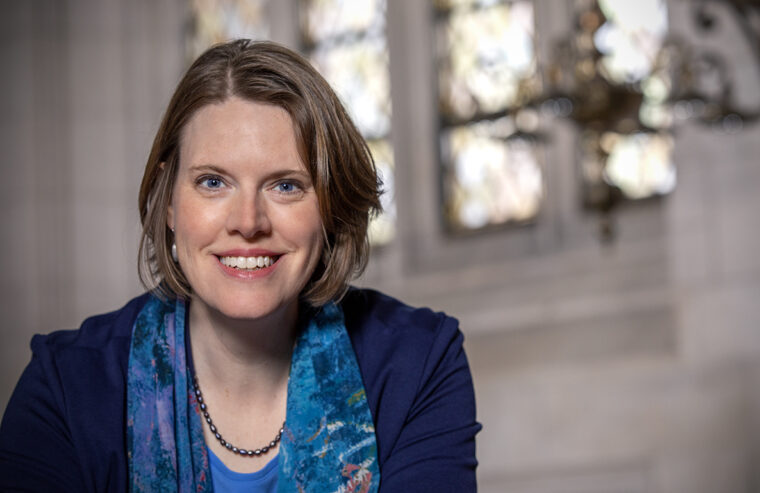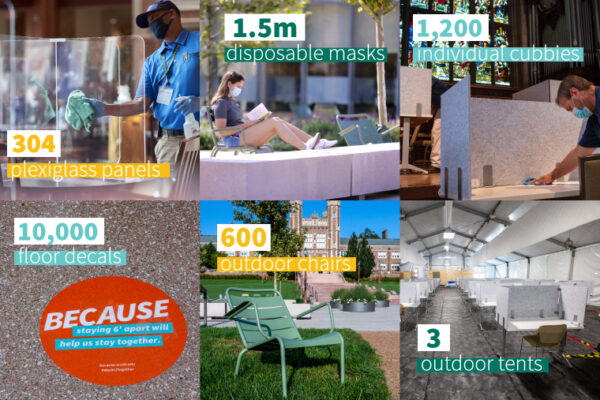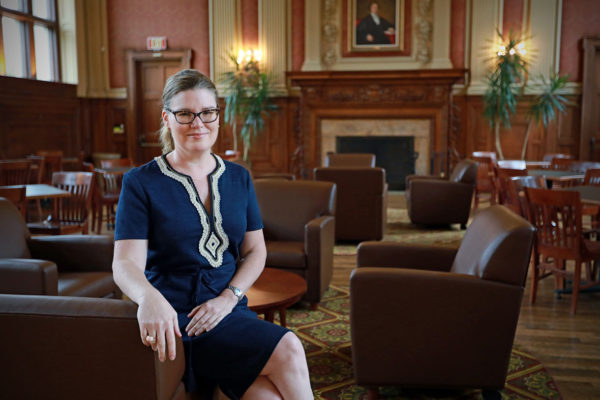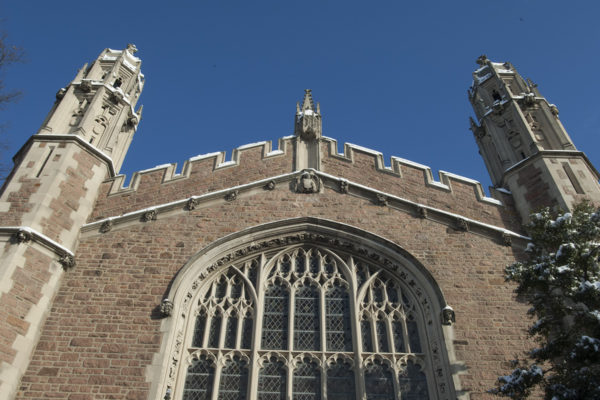Iconic, awe-inspiring and, at last, more accessible. Washington University in St. Louis’ nondenominational Graham Chapel is now open from 9 a.m. to 5 p.m. weekdays for silent meditation, reflection and prayer.
“Graham Chapel is there for people of any or no faith tradition to catch their breath, to reflect, to just be,” said the Rev. Callista Isabelle, director for religious, spiritual and ethical life. “This place will be a quiet sanctuary, a place where nothing is asked of you.”
The new initiative is supported by Lori White, vice chancellor for student affairs, who long lamented that Graham Chapel was used primarily for scheduled events such as Assembly Series speakers, concerts and comedy shows. When Isabelle arrived in the fall, White tasked her and others with finding a way to make the chapel accessible and welcoming to all. Isabelle started small, hosting a “Pause at Graham Chapel” program. Some visitors came to pray, others to view the ornate carvings and stained-glass windows and others, still, to simply take a break.
“This beautiful chapel is in the center of the Danforth Campus and yet many members of our community have never been inside, or have only been in the chapel during a large event,” Isabelle said. “It was a privilege to see people walk into such a beautiful space and have this sense of awe come over them.”
Promoting the new Graham Chapel hours is one visible way Isabelle is striving to support spiritual life at Washington University. Other efforts include creating a three-year calendar of religious holidays; compiling a directory of prayer spaces on campus; advocating for students with religious dietary needs; serving as adviser to the Washington University Interfaith Alliance; training a cohort of interfaith fellows; and helping plan Interfaith Week, which runs through Friday, Feb. 21.
Here, Isabelle shares more about her work and her vision for the Office for Religious, Spiritual and Ethical Life.
Tell us more about this new role on campus.
Isabelle: It was born, in part, out of student interest for support of under-represented religious groups on campus. So part of my role is to support and advocate for students of all faiths. There is an interest in interfaith dialogue and engagement that this position can hopefully facilitate. I also hope to be a resource in times of crisis and need.
Will it be challenging for you as a Christian to advocate for students whose faiths are different from yours?
Isabelle: That’s a very humbling thing I think about a lot. Personally, I believe I am called to serve community members of all traditions. My belief in advocating for others and loving all drives my work. I’m very humbled that students of many faith traditions feel comfortable in this office. I think that is because I’ve been an advocate in ways that I can, a listening ear without agendas for their group and someone who wants to build bridges.
College can be a time of deep questioning, especially about faith. How do you advise students?
Isabelle: I’m not a counselor, but I am trained in pastoral care. This is a place where students can bring their spiritual and ethical and religious questions and think about how those questions intersect with the other parts of their lives. There may be a student who comes from a religiously devout background and they aren’t sure how they want to practice their religion. Or they may be struggling and wondering, “How am I supposed to pray if I can’t get through the day?”
And then there are the large number of students who identify as not religious or secular and yet these students still have questions about how to live a good life. And some students just want someone to talk to about issues they are having with their roommate, and that’s OK, too. I’m not going to give them answers; I will help them wrestle with these issues.
What was your own college experience like?
Isabelle: I’m from Iowa and went to Gustavus Adolphus College, a small Lutheran school in Minnesota. The college chaplain there was a big influence and provided me a lot of opportunities to explore what it might be like to be a pastor. At the same time, I was exposed to a little —not a lot — more religious diversity than I had grown up in. It was a time when I deepened my own religious tradition and also began to understand that the world is more diverse. At Yale Divinity School, I continued to explore that diversity and led an interfaith council. The work can be fraught because any time you bring together people of different backgrounds, there will be conflict. But if, in an interfaith space, you are agreeing all of the time, then you’re not digging deep enough.



